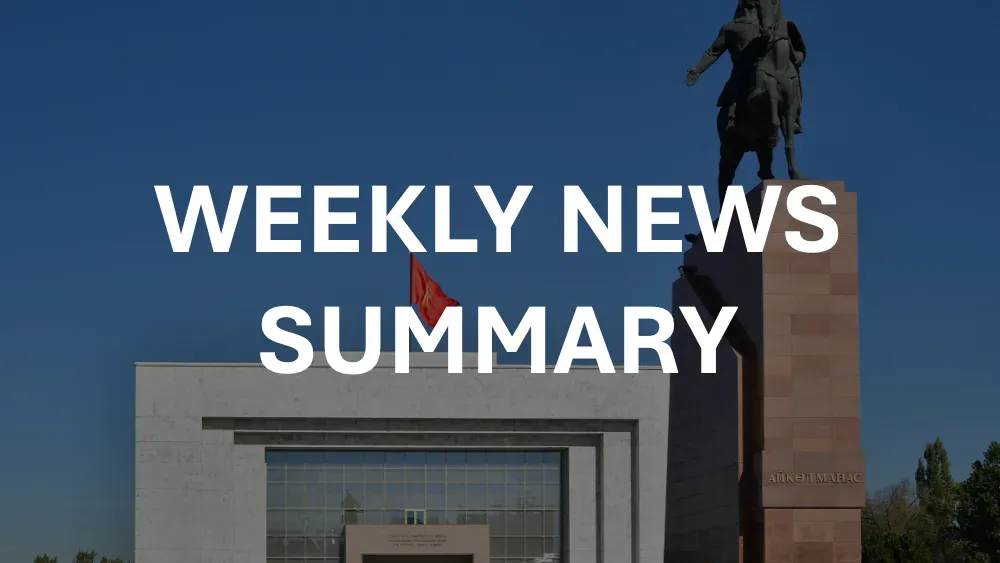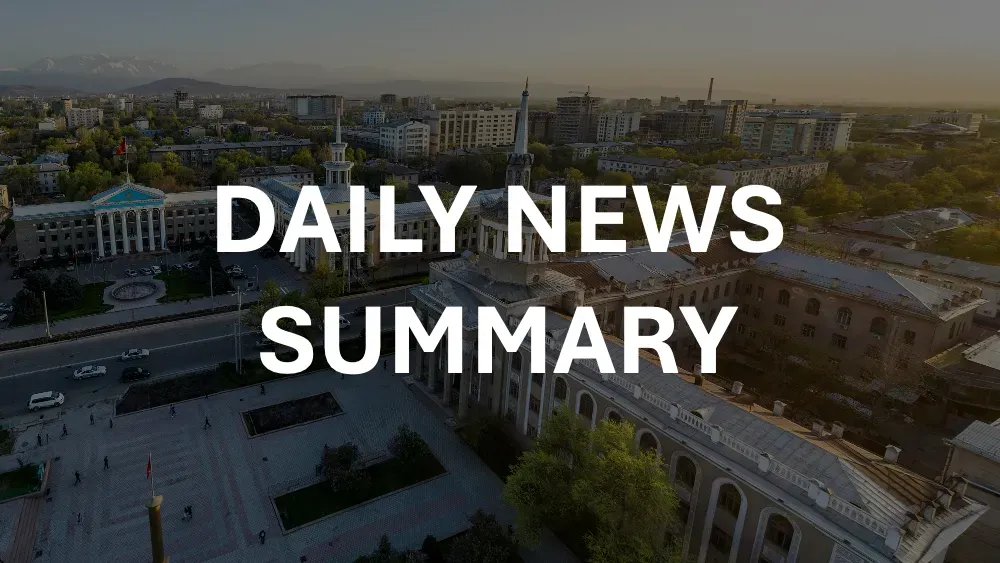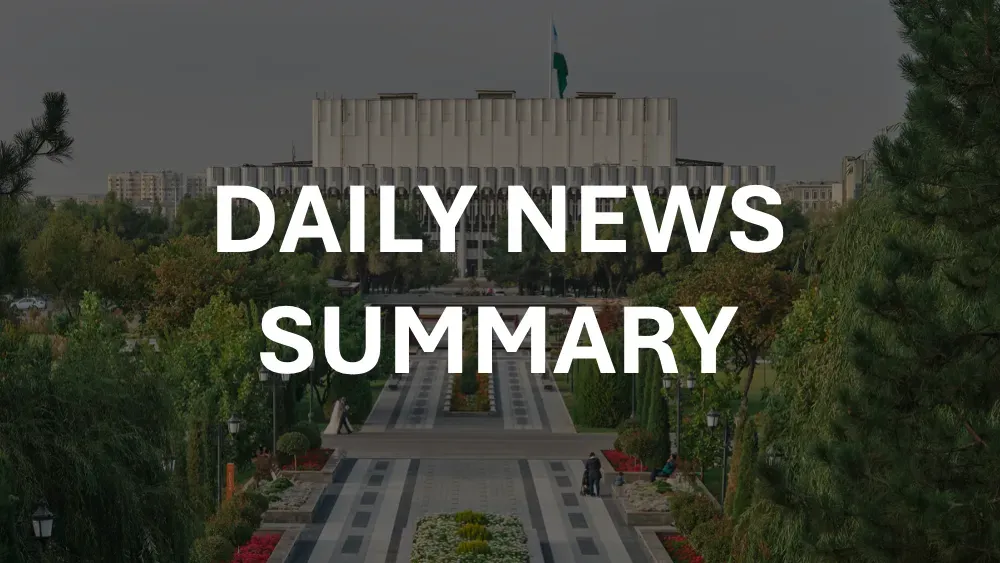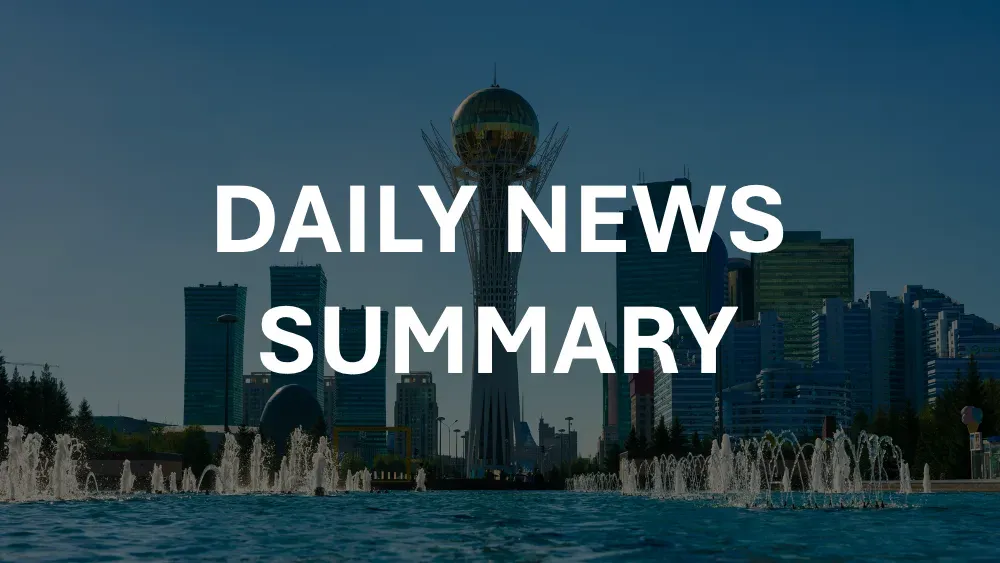This weekly digest showcases just 10 stories. Daily subscribers receive comprehensive intelligence briefs with 40 of the top stories organized by category. Don't miss the stories that matter.
Subscribe to Daily →
September 5, 2025 to September 11, 2025
This week's top 10 stories from Kyrgyzstan, selected from our daily intelligence briefs.
1. Procedure Outlined for Potential Early Dissolution of Parliament and Snap Elections
Kyrgyzstan’s Jogorku Kenesh is debating a legally prescribed procedure for voluntary self-dissolution that would enable snap parliamentary elections if adopted. A dissolution motion can be tabled by one‑third of deputies, must include justification, and is circulated by the speaker within two days to factions, deputy groups and independents, who have seven days to send observations to the responsible committee; after coordination, a full parliamentary debate (maximum three days) is held and dissolution requires a two‑thirds majority of all deputies.
If two‑thirds approve, the president must call early elections within five days and those elections must occur no later than 45 days after the decree; current deputies remain in office until the new convocation’s first session. The Central Election Commission has signalled readiness to run a vote under the recently adopted electoral law that would elect the next parliament from 30 multimember regional districts with three seats each.
From daily brief: 2025-09-10
2. Tri-Nation Power Protocol Secures Winter Imports and Saves Toktogul Water Through Spring 2026
Kyrgyzstan, Kazakhstan and Uzbekistan on Sept. 9 signed a trilateral protocol in Cholpon-Ata to supply electricity to Kyrgyzstan through spring 2026, coordinating winter imports with efforts to conserve water in the Toktogul reservoir. The agreement specifies responsibilities for Kazakh and Uzbek deliveries during autumn and winter, establishes transit arrangements to route Russian imports via Kazakhstan and Turkmen power via Uzbekistan, and is complemented by a bilateral Kyrgyz–Kazakh protocol to guarantee additional deliveries.
The measures aim to shore up regional energy security while protecting hydropower reserves that drive Kyrgyz grid stability and irrigation schedules; Energy Minister Taalaibek Ibraev framed the accords as essential to uninterrupted supply and pledged adherence to the delivery schedules. The signatories included energy and water authorities from all three states, reflecting cross‑sector coordination to balance seasonal electricity demand with water‑saving objectives through spring 2026.
From daily brief: 2025-09-10
3. Tri-Nation Power Protocol Secures Winter Imports and Transit Routes Through 2026 Spring
Kyrgyzstan, Kazakhstan and Uzbekistan signed a trilateral electricity protocol in Cholpon-Ata that secures power supplies and transit arrangements through spring 2026 to optimize operations of the Toktogul Reservoir and manage seasonal deficits. Under the agreement—negotiated by energy and water ministries and national utilities and cited by Kyrgyz Energy Minister Taalaibek Ibraev—Kazakhstan and Uzbekistan will supply electricity to Kyrgyzstan during the autumn–winter period, reducing pressure on hydropower releases and helping maintain grid stability across the region.
The protocol also formalizes transit terms to route Russian and Turkmen electricity through Kazakhstan’s system and onward via Uzbekistan to Kyrgyzstan, expanding balancing options and reinforcing Central Asia’s interconnected grid. A concurrent bilateral protocol between Kyrgyzstan and Kazakhstan further clarifies deliveries; together the measures signal closer operational coordination through spring 2026 and a pragmatic response to seasonal hydrological variability affecting energy security.
From daily brief: 2025-09-09
4. Prime Ministers Discuss Expanding Bilateral Projects in Industry, Energy and Digital Economy
Kyrgyz Cabinet Chairman Adylbek Kasymaliev and Russian Prime Minister Mikhail Mishustin held a phone call on 7 September 2025 to review bilateral trade and economic cooperation, with a clear focus on accelerating joint projects in industry, energy, transport infrastructure and the digital economy. The discussion, reported by the Russian government, emphasized practical implementation—coordination on financing, timelines and regulatory harmonization—rather than new accords, indicating an intent to move from planning to near‑term execution.
The leaders also addressed deeper integration within the Eurasian Economic Union (EAEU), prioritizing alignment on standards, market access and logistics frameworks to stabilize shifting regional supply chains. For international professionals, the call signals Moscow and Bishkek are prioritizing tangible upgrades to infrastructure and digitalization to sustain trade flows, which could create forthcoming procurement and financing opportunities across the specified sectors.
From daily brief: 2025-09-08
5. Record Reserves Top $7B as Public Debt Exceeds $8.3B, lifting import cover but widening liabilities
Kyrgyzstan’s gross international reserves reached a record $7.021 billion as of 3 September 2025, up 38% since January, the National Bank said, driven by domestic and external market operations and favorable precious metals prices. The stockpile now covers an estimated 5.7 months of imports, placing external buffers comfortably within international adequacy norms and supporting currency stability and external obligations.
At the same time, public debt climbed to $8.384 billion by 30 June 2025—nearly $2 billion higher than in 2024—making Kyrgyzstan the fastest-growing debtor among EEU members, according to the Eurasian Economic Commission and the Finance Ministry. The juxtaposition of stronger reserves and rising liabilities underscores a growing need for coordinated fiscal and monetary policy to manage liquidity, debt-servicing risks and medium‑term external vulnerability.
From daily brief: 2025-09-06
6. Dollar Trades at 87.40–87.60 KGS in Banks as Central Bank Sets 87.38 Reference
On 4 September at 09:30, commercial banks and exchange offices in Kyrgyzstan were quoting the U.S. dollar at 87.40 KGS (buy) and 87.60 KGS (sell), while the National Bank of the Kyrgyz Republic posted an official reference rate of 87.38 KGS. The tight 20-tiyin cash spread and near-identical alignment with the central bank’s reference rate point to stable intraday liquidity and limited arbitrage opportunities between official and cash markets.
For international businesses and financial professionals, today’s pricing suggests muted FX volatility and no immediate pressure on the central bank to intervene—conditions supportive of routine trade settlements and remittances. Market participants monitoring deviations from the National Bank rate can interpret these figures as indicative of normal demand-supply balance in the Kyrgyz som/dollar market.
From daily brief: 2025-09-05
7. SCO Anti-Terror Council Convenes in Cholpon-Ata, Kyrgyzstan Launches Chairmanship Agenda and Proposes New Crime-Fighting Center
Kyrgyzstan hosted the 44th meeting of the Shanghai Cooperation Organisation’s Regional Anti‑Terrorist Structure (RATS) in Cholpon‑Ata, convening deputy heads of security bodies from nine member states (Belarus, India, Iran, Kazakhstan, China, Pakistan, Russia, Tajikistan and Uzbekistan) as it launched Bishkek’s SCO chairmanship agenda for 2025–2026. Under State Committee for National Security Chairman Kamchybek Tashiev, participants coordinated joint measures against terrorism, extremism and separatism, agreed to strengthen intelligence sharing, conduct joint exercises, and run public information campaigns and practical workshops to counter online radicalization and the misuse of AI and cyberspace by terrorist groups.
Bishkek proposed creating a Transnational Organized Crime Center based in the capital and signaled a push to modernize regional security mechanisms and deepen operational coordination across member services. The meeting’s emphasis on technical responses (cyber/AI countermeasures, capacity‑building workshops) and institutional initiatives (new center, expanded information exchange) indicates a shift toward more integrated, technology‑focused counterterrorism cooperation during Kyrgyzstan’s 2025–2026 chairmanship.
From daily brief: 2025-09-11
8. Euro Tops 102 Som as National Bank Updates Weekend Exchange Rates
On September 6 the National Bank of the Kyrgyz Republic published its routine weekend exchange rates showing continued som weakness versus major currencies: commercial banks buy the U.S. dollar at 87.25 som and sell at 87.72, the Russian ruble trades around 1.06–1.09 som, and the euro has exceeded 102 som. The relatively tight dollar bid‑ask spread indicates stable banking liquidity, but the euro’s rise above 102 som points to external pressure from stronger foreign currencies and could increase short‑term costs for firms with euro‑denominated contracts or import exposure.
No monetary policy changes were announced; the rates reflect the central bank’s daily update. For international businesses and investors, the key implications are potential import‑cost pass‑through into local prices, margin pressure for euro‑priced liabilities, and the need to monitor regional currency dynamics and seasonal demand that may sustain euro strength.
From daily brief: 2025-09-07
9. Inflation Accelerates to 7.7% in Q2 as External Price Shocks and Domestic Demand Strengthen
Kyrgyzstan’s annual inflation accelerated to 8.0% in June, with quarterly inflation reaching 7.7% in Q2 2025, the National Bank reports. Inflationary pressures were driven by volatile global food and energy markets, heightened geopolitical risk and tighter trade policies, compounded domestically by tariff increases for electricity and heat, higher wages, expanded fiscal spending and rising credit. Food inflation hit 10.2% in June (meat +17.2%, fruit +22.3%), while non‑food and services rose 5.5% and 5.6%, respectively. Fuel cost pass‑through is adding second‑round logistics pressure.
Real GDP grew 11.4% in H1 2025, supported by construction, services and industry, alongside real wage growth of 11.5% and remittances up 26.2%, underscoring robust demand that is reinforcing price pressures. The National Bank held its policy rate at 9.0% through Q2 and raised it to 9.25% in late July; it projects year‑end inflation at 8.5–9.0% while targeting 5–7% over the medium term, signaling a cautious tightening bias to balance growth and disinflation risks.
From daily brief: 2025-09-06
10. US–Kyrgyz Dialogue in New York Centers on Trade, Visas, and Expanded Cooperation
Kyrgyz Ambassador Aybek Moldogaziev met in New York with Bethany Morrison, head of the U.S. State Department’s Bureau for South and Central Asia, to review priority issues in bilateral relations. The officials discussed strengthening political dialogue, organizing joint activities, expanding trade and economic ties, and addressing visa matters, and signaled interest in more predictable, practical facilitation measures for business and official exchanges.
Ambassador Moldogaziev conveyed thanks for U.S. Independence Day congratulations from President Donald Trump and Secretary of State M. Rubio, underscoring a positive diplomatic tone. Both sides affirmed commitment to deepen mutually beneficial cooperation across government and economic channels, suggesting potential near‑term movement on trade and visa facilitation that could affect Kyrgyz‑American commercial and official engagement.
From daily brief: 2025-09-06
About This Weekly Digest
The stories above represent the most significant developments from Kyrgyzstan this week, selected through our AI-powered analysis of hundreds of local news articles. Our ranking system evaluates each story based on:
• Impact on international interests - How the story affects diplomatic, business, and development activities • Strategic significance - The story's importance for understanding Kyrgyzstan's trajectory and regional dynamics
• Economic and political weight - The scale of economic impact or political change involved • Relevance to foreign professionals - Direct implications for international organizations and businesses operating in Kyrgyzstan
Stories are drawn from our daily intelligence briefs, which synthesize reporting from Kyrgyzstan's leading news sources to provide comprehensive situational awareness for international decision-makers.
These weekly highlights are a small sample of what's happening. Daily subscribers get comprehensive briefings with 40 top stories that connect the dots between events, track developing stories, and provide the context you need for informed decision-making.
Upgrade to Daily →






